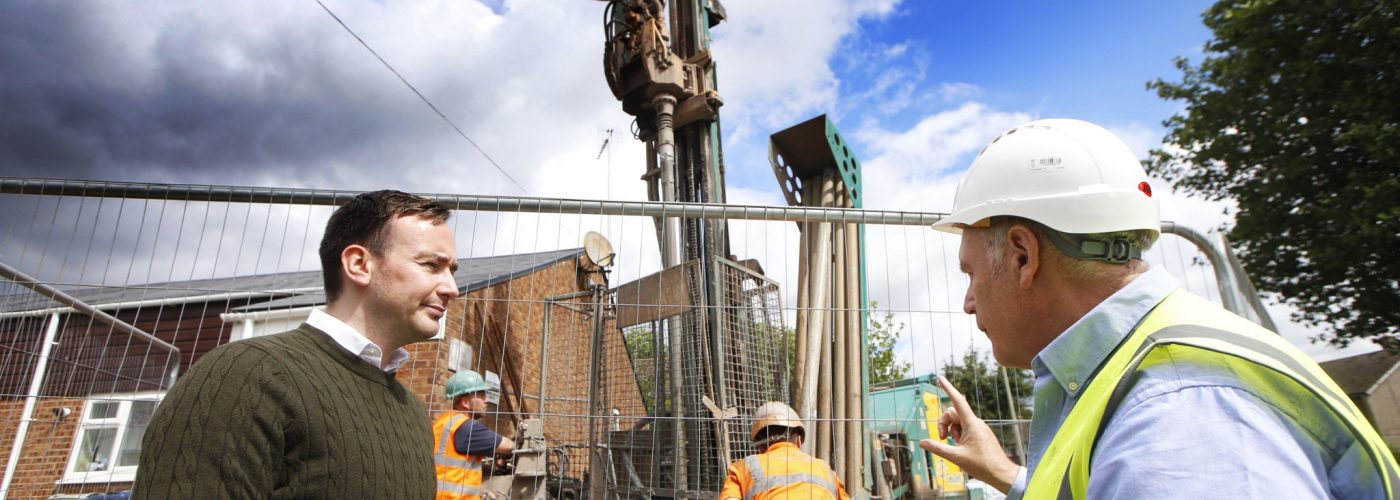A pioneering smart renewable heating scheme in Oxford, part of the £41m Energy Superhub Oxford project, has been given the green light to proceed following lockdown disruption, providing a confidence boost for the construction and renewables industries as they rise to covid-19 operational challenges, and a positive step towards the UK defining how it will meet its 2050 net zero target. The recommencement of the scheme with leading housing provider, Stonewater, and Kensa Contracting, will contribute to the Energy Superhub Oxford (ESO) project’s anticipated savings of 10,000 tonnes of carbon dioxide emissions a year by 2021; the equivalent of taking 2,000 cars off the road.
The 60-homes in Blackbird Leys will demonstrate how decarbonisation of heating using ground source heat pumps can interact with local energy systems to allow millions of homes to cut carbon and costs, and adopt a ‘smart cities’ model. The trial represents 20% of homes committed to receiving smart heating with Kensa ground source heat pumps as part of ESO, a world-first project backed by UKRI which is pioneering a model for the rapid decarbonisation of power, transport and heat in cities across the UK and globally. ESO showcases rapid electric vehicle charging, hybrid battery energy storage systems, low carbon heating, and smart energy management to improve air quality and accelerate Oxford’s journey to zero carbon.
Councillor Tom Hayes, Deputy Leader and Cabinet Member for Green Transport and Zero Carbon Oxford, Oxford City Council, visited the smart heat pump project as works resumed:
“I am delighted that Blackbird Leys residents are first in line to benefit from a heat pumps system that saves them money and shrinks the city’s carbon footprint. Oxford’s Citizens’ Assembly on Climate Change was clear that greener homes would be better homes, cheaper to heat. It was brilliant to visit the site of the new heat pumps, talk with the people making this aspect of Energy Superhub Oxford happen, and see at a social distance the positive impacts for local people. This year we have taken exciting steps forwards as part of the Energy Superhub Oxford project with the installation of electric vehicle chargers, electrification of the City Council’s fleet, and delivery of the electricity transformer to the National Grid substation in Cowley.”
The residents at Blackbird Leys will have their night storage heating system replaced with a Kensa Shoebox ground source heat pump system coupled with Switchee heating controls, which will constantly sense, learn and respond to the inhabitant’s behaviour. Adding a further smart technology dimension to the running of the heat pump, Kensa’s heat optimisation software will take a day-ahead forecast of half hourly electricity costs, and automatically shift the operating times to enable the occupants to make savings from dynamic tariffs without having to change their behaviour.
The smart heating system at Blackbird Leys is expected to save residents 3,520 tonnes of CO2 over their lifetime and cut their current night storage heating bills to levels lower than that of mains gas, all without adding strain to the UK’s electricity grid; a triple-challenge the renewables industry must overcome to ensure low carbon ground source heat pump technology is more widely adopted by society.
Dr Matthew Trewhella, Managing Director at Kensa Contracting explains:
“By introducing flexibility in how and when ground source heat pumps run, this trial will demonstrate how we can save residents even more money than typical ground source heat pump installations, even below the cost of gas, whilst modelling the impact heat pumps can have on balancing the electricity grid’s carbon and use/cost intensity.
“Already low carbon and low cost, the ground source heat pump system at Blackbird Leys will save residents a further 25% in heating bills compared to a standard Kensa installation.”
Adam Masters, Sustainability Project Manager at Stonewater, said:
“The latest IPPR report found that at least 12 million homes in England need to be fitted with heat pumps and new energy efficiency measures if the UK is to meet its net zero targets by 2050, and lift thousands of households out of fuel poverty.
“Through this project we’re demonstrating how housing providers can not only work towards a more sustainable future, but an economical one for their customers too, and we’re pleased that work at this particular housing scheme has been able to recommence.”
Kensa hope its role in Oxford’s trial of the electrification and decarbonisation of integrated heat, power and transport, will encourage the adoption of Smart Local Energy System models across more cities, rural developments, towns and villages.
Dr Trewhella elaborates:
“An elegant advantage of this smart renewable heating approach is we can manage the running times of multiple heat pumps depending on the desired outcomes; in this project we have chosen to prioritise running costs. For greater carbon savings, you could switch the priority to carbon, or to grid management to stabilise voltages. All outcomes offer all benefits to some degree, but in different ratios depending on the priority. Here we are trying to fix the problem of electricity demand that is going to exist in five years’ time as the UK migrates to low-carbon electrical heating systems over fossil fuels and electric vehicles; this project is a great demonstrator of our future local energy systems strategy.”
A blog documenting Kensa Contracting’s smart renewable heating pilot scheme with Stonewater is available to follow here. A virtual site tour of the Blackbird Leys scheme is to be hosted in October 2020. Interest in this event can be registered by emailing events@thekensagroup.com.





